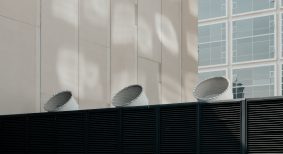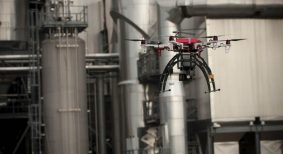Municipalities face a number of challenges every day from job creation and affordable housing to infrastructure and financing infrastructure. Ontario-based post-secondary students were given the chance to help solve such issues and present innovative proposals to the province’s big city mayors during the Cities of Tomorrow Showcase and Student Ideas Competition, which took place earlier this week.
Three teams of finalists in the infrastructure category, who happened to all be from the University of Toronto, responded to critical urban infrastructure needs with ideas ranging from information technology and public washrooms to cycling infrastructure.
Mayors and experts based criteria on the proposal’s level of impact on urban centres and how feasibility they can be implemented.
The award went to Carolyn Rowan and Chris Hilbrecht for their concept ArtStall, a place-making project that helps address problems associated with public washrooms and public art alike.
The duo noted that Toronto is notorious for not recognizing accessible, 24-hour, free public toilets as valuable infrastructure and has no plan to install more. Meanwhile, the lack of such infrastructure “hits some harder than most,” including families with small children, pregnant women, people with medical conditions and those who can’t access washrooms in the basements and tops of older buildings.
Their proposal includes bringing patented Portland Loos—accessible, compact, durable and crime- preventing toilets—to Toronto. These toilets, already installed around Portland, Oregon, would also be colourful and creative, as local artists would be commissioned to decorate them with public art.
The sustainable advantage is the washroom can be off-grid and lit entirely by solar-powered LED fixtures. The restroom can be pre-wired for 115 volt AC power or powered by a hybrid system of solar and AC.
The second team of finalists met two years ago in the University of Toronto Master of Planning program. Kyle Miller and Michael Himmel proposed to create a non-profit centre for excellence, responsible for collecting and tracking data on infrastructure so money is spent in a transparent and accountable way. They cited the Union Station reconstruction project as one key inspiration for their idea. The site is already more than $160 million over budget and delayed by two years. This is the same amount of money St. Catharines, Ontario needs to repair its entire infrastructure deficit, they said.
A Nobel prize-winning tool known as Reference Class Forecasting, which predicts how a system can behave in the future by looking at how it behaves in the past, would help planners and decision-makers maintain a better track record for spending and save the city millions of dollars.
Such a tool seems of critical significance as the province and federal government both have plans to spend about $130 billion each on new infrastructure over the next ten years.
The third team to present in the infrastructure category were Kamila Grigo and Aubrey Chernykh, who proposed a toolkit of cost-effective. incremental cycling retrofit designs that are adaptable to existing infrastructure sites and would accommodate larger service vehicles, such as snow removal equipment.
The team wanted to present a plan that responds to the political and economic challenges municipalities face in accommodating the needs of cyclists. The retrofits are quick and flexible and merge with the existing landscape to create recreational and cultural programming.
The Cities of Tomorrow Contest was created in 2014 to honour former City of Mississauga Mayor Hazel McCallion and longtime chair of the Large Urban Mayor’s Caucus of Ontario.
More information, including other issues addressed and the respective proposals, finalists and winners, can be found on the Cities of Tomorrow website.










